Russia Launches Swarm Of Iranian Drones At Ukraine Civilian Targets
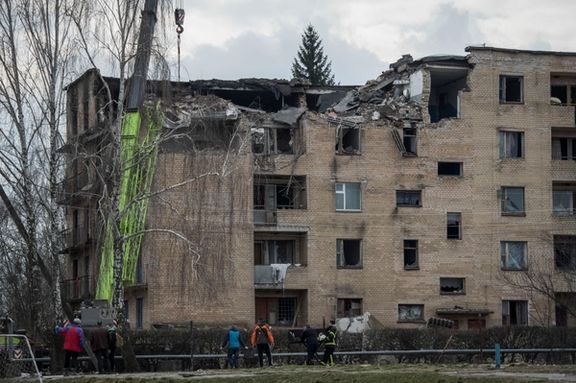
Russia launched 21 Iranian drones against civilian targets in Ukraine Wednesday, one day after China’s President Xi Jinping concluded a visit to Moscow.

Russia launched 21 Iranian drones against civilian targets in Ukraine Wednesday, one day after China’s President Xi Jinping concluded a visit to Moscow.
At least four people were killed in the north of the country as sirens blared across the capital Kyiv and swaths of northern Ukraine overnight. The military said that it shot down 16 of the Iranian Shahed kamikaze drones but the rest got though.
Two housing blocks and an educational facility in the riverside town of Rzhyshchiv south of the capital had been partially destroyed, the State Emergency Service said on the Telegram messaging app.
"Over 20 Iranian murderous drones, plus missiles, numerous shelling incidents, and that's just in one last night of Russian terror against Ukraine," President Volodymyr Zelenskiy said on Twitter.
In an apparent reference to the Chinese leader's visit, he added: "Every time someone tries to hear the word 'peace' in Moscow, another order is given there for such criminal strikes."
Iran has supplied hundreds of killer drones to Russia since mid-2022, angering Western powers that supply air defense weapons to Ukraine to protect both military and civilian installations. Massive Russian missile and drone attacks since September aimed to destroy Ukraine’s energy infrastructure to make it hard for civilians to survive the winter.
Iran’s Supreme Leader Ali Khamenei completely denied Iran’s involvement in the war during a speech he delivered Tuesday on the occasion of the new year Nowruz.
China proposed a peace plan for Ukraine last month, which the West has largely dismissed as vague at best, and at worst a ploy to buy time for Putin to regroup his forces.
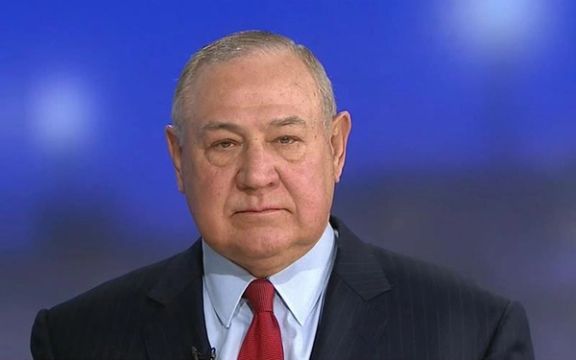
US military commanders urged the Biden Administration to expedite sales of advanced weapons to Israel to deter and prevent Iran's nuclear threat.
In an open letter published by the Jewish Institute for National Security of America, 44 American generals and admirals wrote, “To confront this pressing high-priority threat, the United States should immediately provide Israel with the advanced weapons it needs to deter and prevent a nuclear Iran.”
The US, Israel’s biggest defense supplier, was urged by the group to “expedite delivery—through outright sale, temporary lease, or prepositioning in Israel—KC-46A aerial refueling tankers, F-15I’s, F-35s, and precision-guided munitions, such as the Joint Direct Attack Munition (JDAM)”.
However, Israel, Iran’s nemesis, currently has its lowest ever approval rating from the Democrats amidst ongoing conflict with the Palestinians which have seen clashes at their worst since the second intifada 20 years ago, and a right-wing government trying to overhaul the judicial system, impose strict religious policies as well as expanding settlement building, contravening international law.
Iran says its nuclear technology is solely for civil purposes, but its policy of enriching uranium to over 80 percent has no civilian use and only a short step away from bomb-level purity of 90 percent. The nuclear threat is “one of the most pressing strategic challenges America faces today”, according to the group.
“Our military experience has taught us that demonstrating the willingness and capability to use force offers the best chance against having to do so. If a conflict does commence, it is best to possess already the weapons necessary to achieve success,” the group added.
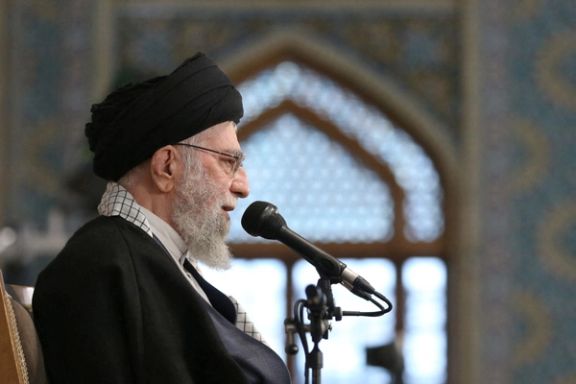
In his vitriolic new year speech, Iran’s Supreme Leader claimed the US president and European heads of state arm the country’s revolutionaries.
“During recent unrest, the US president and heads of states of certain European countries openly offered weapons and financial and security support to rioters to weaken the Islamic Republic but what happened was the opposite,” he said, in spite of the country being in its worst economic recession for decades and all but isolated on the world stage.
The allegation was one of many thrown at the West in a new year speech Tuesday, amidst outright denials of Iran’s having sent drones to Russia for use in its invasion of Ukraine. “We categorically deny any presence in the Ukraine war and such a thing is not true at all,” he said.
The remarks show little has changed in the regime rhetoric after more than six months of protests calling for an end to the Islamic dictatorship.
Khamenei, whose public speeches are always peppered with scathing criticism of the West, said not only has the ‘enemy’ fanned the flames of unrest in the country, triggered by the death in custody of Iranian-Kurd, Mahsa Amini, but claimed the West’s goal is to topple the regime and in turn, see “Islam fade into oblivion”.
It is what he terms a “hybrid war” against Iran waged by the West to undermine clerical rule, a propaganda war to “undermine the nation’s will, sow despair among the youth, and make them disappointed at the future, work, and progress by fudging the facts”.
This emphasis on such conspiracies are meant to deflect attention from the fact that Iran’s economy is in crisis and young people have lost all hope for their future, yearning for cultural and personal freedoms away from suffocating religious laws.
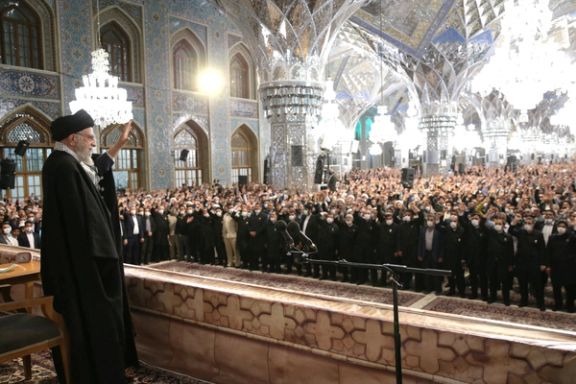
Khamenei who espouses a 20th-century leftist ideology of anti-imperialism also accused the West of having colonial designs on Iran. “In everything they do, they seek to politically and economically dominate Iran and plunder it,” he maintained.
Perhaps reflecting his deep resentment towards Saudi Arabia, which is no secret, Iran’s 83-year old authoritarian ruler failed to mention a recent agreement with the oil-rich Persian Gulf state to normalize relations, despite the fact that the deal announced earlier this month came as a diplomatic earthquake in the region and possibly the biggest diplomatic victory for Iran in years.
Removing it from isolation from one of the region’s biggest powers, the deal has brought Iran in from the cold at a time when it has become a pariah on the world stage, not least, since the collapse of nuclear talks, the JCPOA, after Iran's intransigence in negotiations.
Khamenei has long labelled the Saudi ruling elite as “corrupt” and un-Islamic, but approved restoration of ties amid its own isolation.
Recently, more and more politicians and commentators in Iran call for an opening to the world, arguing that in the 21st century no country can succeed alone. The Iranian regime’s ongoing nuclear program and its support for dangerous militant groups around the region have further isolated the country both politically and economically.
Showing no signs of weakening these proxy groups based in several countries including Lebanon and Iraq, in addition to cells far beyond the Arab world, Khamenei also reiterated support for what he calls his “axis of resistance”.
While it is hoped that the Saudi deal will mean Iran’s disarming the Houthis in Yemen, skeptics suspect the regime will not alter its policy of arming its proxies around the region. It is as yet unclear if the Houthis too, will agree to disarming.
While relations with the West continue to nosedive, Khamenei claimed that “the West’s efforts to isolate Iran have failed,” praising his policy of forging closer relations with dictatorships China and Russia, what he has dubbed as a policy of “looking East”
He had little to say on matters of economy to reassure the people that the worst recession in decades showed any sign of abating.
Economically, Iran has fallen behind even in the oil and natural gas sectors which represent its main sources of foreign currency revenues needed for economic development. Its energy sector needs upwards of $200 billion in investments, according to its own oil minister Javad Owji, in spite of the country sitting on the world’s second biggest oil fields.
In a bizarre twist, Khamenei said that Iran should even ditch the US dollar after months of sharp declines in the value of the rial, claiming that several sanctioned countries which stopped using the dollar found “their situation got better”. He failed to give examples of such wild claims.
The fate of the country remains in the hands of an aging leader with old-fashioned diplomatic and economic policies. It may be a new year for Iran, but it is still, old rhetoric which dogs its leadership.
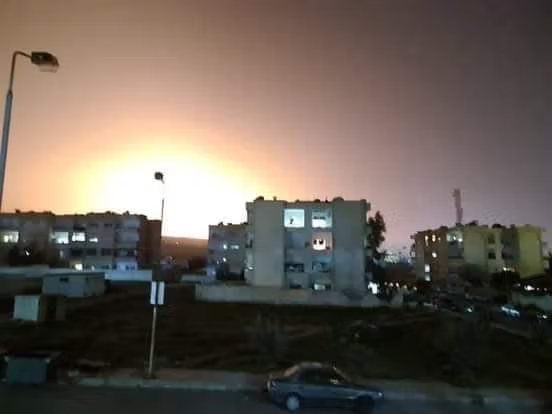
Israel hit targets near Syria's Aleppo airport Wednesday in an air strike reportedly aimed at destroying an Iranian arms depot.
The Syrian defense ministry said the air strike targeted the vicinity of Syria's Aleppo airport causing some "material damage.”
Israel has been carrying out regular attacks since 2017 against what it has described as Iran-linked targets in Syria, where Tehran's influence has grown since it began supporting President Bashar al-Assad in the civil war that started in 2011.
In the third attack on Aleppo airport in six months, Israel launched "a number of missiles from the Mediterranean Sea, west of the coastal city of Latakia, at 3:55 a.m.", the Syrian defense ministry said in a statement on state media.
Two regional intelligence sources told Reuters the strike hit an underground munitions depot linked to the nearby Nairab military airport, where missile-guided systems delivered onboard several Iranian military planes had been stored.
Iran has increased the use of Aleppo airport to deliver more arms over the past month, taking advantage of heavy air traffic as cargo planes offload relief aid in the wake of the February's deadly earthquake, Western intelligence sources say.
An Israeli strike on March 7 that knocked Aleppo airport out of service had blown up an Iranian arms cargo shipment hours after it was delivered by an Iranian plane that Damascus said was carrying aid, the Western intelligence sources say.
Israel has in recent months intensified strikes on Syrian airports and air bases to disrupt Iran's use of aerial supply lines to deliver arms to allies in Syria and Lebanon, including Lebanon's Iran-backed Hezbollah.
The strikes are part of an escalation of what has been a low-intensity conflict termed a "war between wars", the goal of which has been to slow Iran's entrenchment in Syria, Israeli military experts say.
Iran's proxy militias, led by Hezbollah, now hold sway in vast areas in eastern, southern, and northwestern Syria and in several suburbs around the capital.

As the Iranian year was coming to an end on March 20, some local media presented a more than disappointing assessment over the performance of the parliament.
The election for the next parliament (Majles) is less than 11 months from now, and the current parliament, whose members call themselves "revolutionaries" has had no achievement to be proud of.
Khabar Online website in Tehran summarized the "radical parliament's" track record saying that the Majles was "unable to meet the society's demands and incapable of supervising the government's performance” or holding it accountable for shortcomings the media have been complaining about on a daily basis.
According to the website, lawmakers have failed to address issues such as the the economic hardship people face, the fall of the Iranian currency, deadlock in the country's foreign policy, international isolation, inefficiency of local governors and other officials including cabinet ministers. They have not been able to impeach any minister although they talked about it every single day.
The Majles has not been able even to make the government accountable for the promises given to the people. Nor the Majles asked any serious questions about why the government has not been able to control inflation.
Prices of cars, houses and rents have been constantly on the rise, turning necessities into dreams for citizens. Journalists in Iran tweeted that in some areas people buy their daily bread on credit from neighborhood bakeries, promising to pay at the end of the month.
When at one point in February the US dollar rose to 600,000 rials, Vice President Mohammad Mokhber told the Majles that he cannot do anything about it and lawmakers "can take it or leave it." Parliament simply listened to Mokhber and took no action.
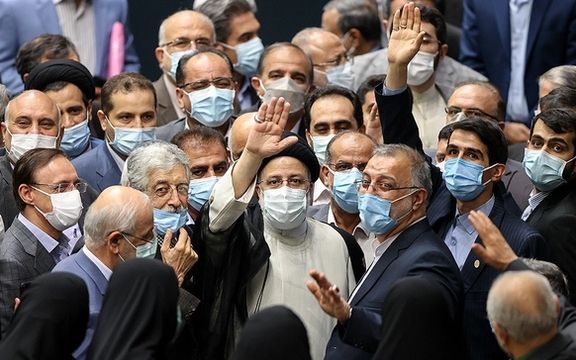
During the year, most proposed bills ended in controversy and remained inconclusive. Here are some examples:
Hijab
While opposition to compulsory hijab was the one of the root causes of the uprising that shook the country for more than five months, the Majles discussed a bill that called for sending text message threats to women and freezing their ID cards and closing their bank accounts as well as forcing them to pay a fine for not wearing their headscarves "properly". They seemed not to care that this was exactly why Mahsa Amini was murdered in police custody.
Women
Another controversial bill proposed to restrict women's freedom to travel abroad, demanding that all women should have the consent of their husband, father or grandfather for a travel permit. Apart from everything else, those who drafted the bill failed to realize who would sign the permit for an 80-year-old woman who has no husband or father. After several denials by lawmakers, no one still knows if the bill has gone any further.
Documenting Crimes and Brutality
As photos and videos of police brutality during the protests went viral on social media, the parliament approved that filming such scenes is strictly prohibited. The bill even called for harsh punishment for anyone who circulated such images on social media or sent them to foreign-based media. Those breaking the law could be charged with colluding with the enemy and acting against national security, the bill stipulated.
"Fake" News
Another controversial bill called for prosecution of anyone who posted any "false" story on social media. The bill said that courts, which are in fact controlled by intelligence agencies, are the authority to determine if a news story was fake. Basically, the bill meant that any account of events different from the official version is punishable.
Other similar bills included barring university students from travelling abroad as a punishment for taking part in protests, as well as controversial attestations that forced government employees to learn to recite the Koran.
While these bills backed by hardliners may not have majority support, supporters can get them passed at the opportune moment. Meanwhile, the parliament has not tackled any legislation to alleviate the financial hardships endured by citizens.
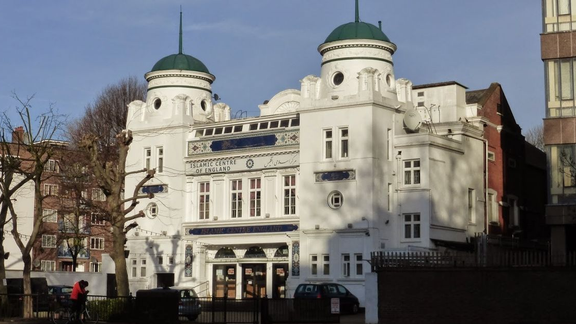
As calls continue to close the British Islamic Center in London, linked to Iran's regime, Security Minister Tom Tugendhat described it as a "vile threat" against the country.
Tugendhat told The Times that the government was “pulling together” to deal with “this vile threat that’s taken over a country and is now threatening ours.”
The British minister had previously warned that the "interference, threat and influence" of the Islamic Republic of Iran on British soil has increased alarmingly.
During a parliamentary debate on Monday, several UK lawmakers called for the Islamic Republic’s outpost to be closed.
Tugendhat stated that lawmakers are “absolutely right” to be worried about such “cultural centers” in Britain.
“Sadly, the Islamic Centre for England is not alone and the work of the IRGC is not limited to those Iranian proxy organizations.”
The center is run by Iranian ruler Ali Khamenei’s representative Seyed Mousavi. The UK Charity Commission has launched an investigation over its governance, the content of its website and the events it organizes.
Previously, a group of Iranians had prepared an online petition for the closure of the Islamic Center of England, which was signed by tens of thousands of people.
In recent months, Iranians have demonstrated many times in London demanding the closure of the center.